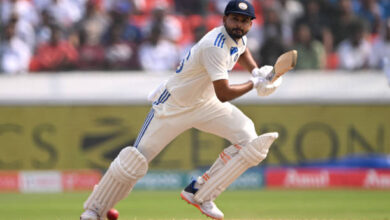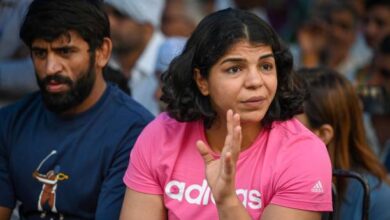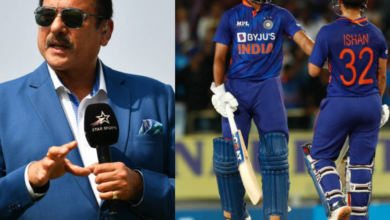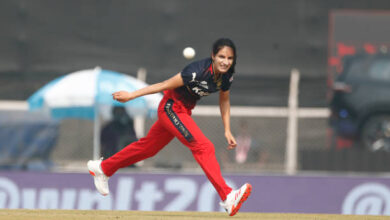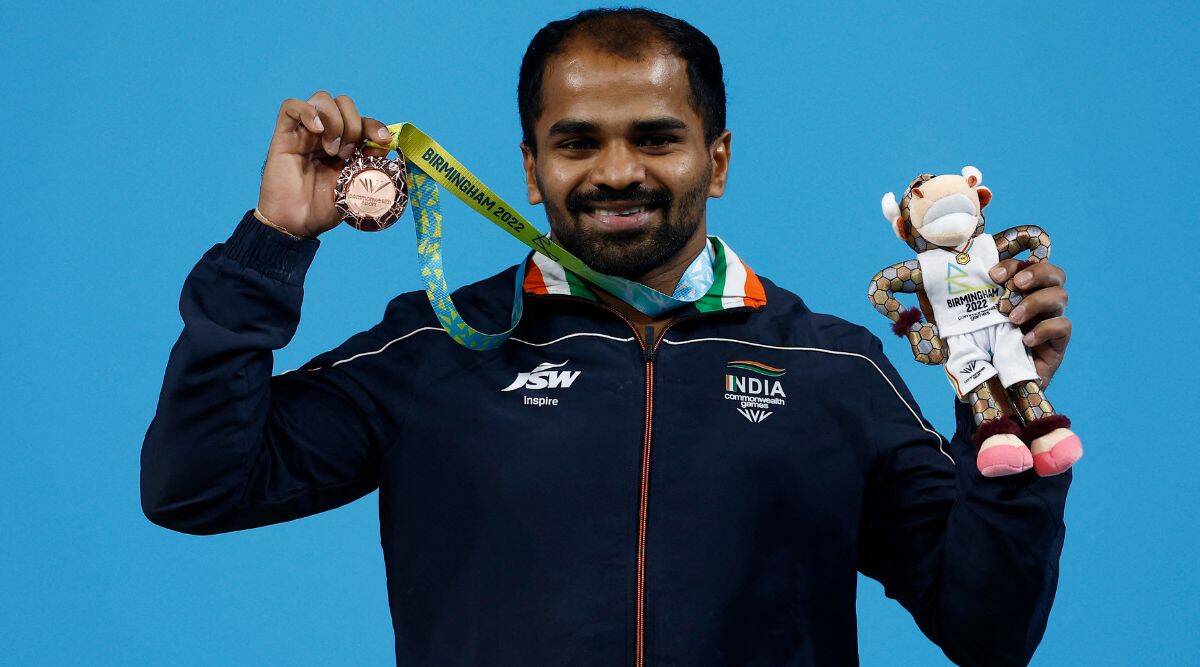
It came in his last attempt. Gururaja Pujari stepped onto the podium knowing that a failed attempt to lift would land him on the podium at the Birmingham Commonwealth Games.
Gururaja, who won a silver medal four years ago, had increased the weight category this time. Locked in a gripping battle with Canada’s Yuri Simard, who pushed the Indian lifter to the limit, he had to lift 151kg in his final attempt to clinch a bronze medal.
Poker-faced, he stood near the barbell and after a loud scream, as if to release the pressure, he lifted the bar and brought it up to his shoulders in one smooth motion. And then, much to the delight of the Indian fans in the stands, he lifted it on his head without any problem and jumped with joy.
Big dreams demand their pound of flesh, though. Gururaja was married last May to Soujanya but hasn’t been able to go back home for a year. Big dreams also come gift-wrapped with pain. Injuries to their wrist and knee meant he could only equal the weight he was lifting in the training. It was enough to fetch him bronze, though it wouldn’t have probably materialized with a push from the coach. The bronze seemed ever so elusive but his coach found the perfect buttons to push him, reminding him about the struggles in the last year. Was he now going to give that up for nothing? Everything hung on his final lift, the coach urged. “Coach me bohot motivate Kiya. Tera medal last lift pe dependent hai bolke”. Now, he is happy to get back home where his wife awaits.
Gururaja lifted a total of 269 kg, which was enough to clinch a bronze medal in the 61 kg category. it was not easy. But then again, the son of a pick-up truck driver never got anything easy.
It’s called the pilgrim stretch — the bustling 130km highway that connects the port city of Mangalore at the southwest tip of the country to the hilly temple town of Kollur. A section of the road teeters along hollow gorges and ravines, where rumbling cranes are busy fishing out the skeletal wreckages of vehicles. Accidents are so commonplace here that not even the vernacular dailies bother to record them unless it involves someone famous.
But Gururaja, with a clutch around his neck, recalls an accident that went on anonymously but shook his family and nearly knocked them out of the game.
This happened almost a decade ago. Gururaja, a year in college in Ujire, was in his village near Kundapura for his sister’s wedding. His father was a pick-up truck driver who used to transport bricks mostly from Mangalore to different parts of the state to raise his wife and eight children. However, for about a week, the truck was in the shed before the wedding.
But what was to be a week of celebration ended in tears. That was when his father’s assistant (vernacularly known as Kili), decided to make a quick buck and took the vehicle without his permission. The truck plunged into a gorge, killing the assistant and shattering the vehicle on the eve of the wedding. “As such, we had just enough to sustain ourselves, now the accident meant that my father was not only out of job but in huge debt. The vehicle belonged to a landlord there. Add to that, the money for the wedding. We were in deep emotional turmoil,” recollects Gururaja.
For him, it meant he had to make ends meet himself. “Previously, even though he didn’t like me pursuing sports, he would somehow manage to fund me, even if he has to borrow. Now, no one would lend him money and my dreams were drifting into the back-burner. Coaching was free, but how would I pay for the supplements, clothes and shoes?” he says, his voice choking.
He decided to ease his father’s burden by forsaking the sport and realigning his priorities to fetch a government job at the earliest. Straightaway, after he reached college, he explained his situation to coach Rajendra Prasad, who then comforted him with words that still ring in his ears when he’s lifting twice or thrice his body weight in a competition. “He told me that a champion is not always self-made, but made by society, and even if he has to sell his property, he will support him. He called everybody in the gym, narrated my story and requested to pool in money for me,” he says.
So they took turns buying him stuff, according to his needs. “Among them was a boy from Bangalore, who was relatively well off. He used to provide money for food supplements,” he says. Back home, a few of his father’s friends funded him to buy a second-hand auto-rickshaw. Gururaja’s elder brothers — he’s fifth among eight — began to shoulder more responsibility, and began to manage enough money to slowly start paying off their debts. And his dreams began to blossom.
Vigorously rubbing the powdery chalk on his palms, Gururaja steps onto the thick blue rubberized platform inside the weightlifting hall at NIS Patiala, touches the barbell reverentially, lips a silent prayer and positions himself over the bar, the yellow bumper plates glistening in the fluorescent glow of the room. Squatting, he clutches the bar, starts to lift it, then teeters and falls. The barbell thunders as it crashes on the mat. “Slip ho Gaya sir,” screams Gururaja, even before coach Vijay Sharma’s gaze droops on his fumble.
Gururaja pauses, gazes sideways, where a fellow camper is plunged on the mat after an “effort” lift and requests a junior to turn off the volume of a popular Punjabi chartbuster that was screeching in the room. When he’s in his zone, he hears nothing. But for some reason, he’s distracted. He then removes his jumper, does a few more stretching routines, goes around the hall and returns to his marked zone, and stiffens his face before he pushes through the squat and heaves it upwards. The bar droops and bounces on his chest; he pushes it loudly into the air, legs thrust apart, arms wobbling and the veins on his forehead popping up like there’s a worm writhing underneath. Then with a final push, he lifts the bar over his head, smiles and holds it longer than he needs to, before throwing it down emphatically, dropping to his knees. Like a wrestler flipping a maligned adversary over his head.
He gets a kick out of the metaphor because he had as a teenager resolved to be a wrestler. “Aama anna, munnadi wrestler airunthe (true brother, I was once a wrestler),” he concurs. Even now, with the bar in his hand, he sometimes channelizes the inner, throttled wrestler.
When he was a child, though short and thin for his age, he never shook back from the bullies at school. So, the physical education teacher put him under a former state wrestler, Sukesh Shetty. But there was no akhada and they trained mostly on mud or clay, the last remnants of a once-throbbing ‘Gatta gusti’ culture in the South Canara and Kollur districts of Karnataka and Northern Malabar in Kerala. But his adolescent mind had another catch in it. “The best part of it was travelling around the state, especially the beautiful countryside.”
He longed for climbing into the truck his father drove and accompany him on long journeys. But his father never let him, for fear of accidents. “He used to take my elder brothers, but not me because I was small and thin. I used to be jealous of them,” he says. He remembers hopping into rickety state buses and travelling to Mangalore, Hassan, Chikmagalur and Shimoga. The further he travelled, the longer he stayed away from school, which he liked. The medals and grace marks took care of his promotions. The grace marks earned him admission to SDM College in Ujire, almost three-and-a-half hours from his home. It was around the same time that wrestling suddenly became glamorous in the country, shortly after Sushil Kumar’s bronze at the Beijing Olympics. He didn’t know how to reach that level but was determined to strive for it. “In our part of the world, there’s no formal training for wrestling and nobody was there to guide or groom me,” he says.
That’s when, Gururaja stresses, destiny began intervening. The moment he got himself enrolled in the college, he went about searching for wrestling coaches in the college and outside. Whoever he asked the question, either gave him a blank stare or laughed through his teeth. The common response was ‘get good grades and find a job. A government job and a posting near his town were all his family had dreamt too. But the subject he chose — Economics–didn’t snatch his imagination one bit. “Books pathale thookam vanthidum, avalo periya books anna (I used to feel sleepy seeing the books, those were really huge ones),” he says, in stuttering Tamil, which he picked watching Vijay’s movies.
But the cold vibes didn’t deter him. He ran endlessly from pillar to post in Ujire, a speck of a town in the Dharmasthala district, where the occasional pilgrim to the famous Dharmasthala Sri Manjunatha Temple drops in to savour the dilapidated grandeur of a Tipu Sultan fort. He even mulled quitting before destiny intervened. “I started hitting the gym and there I met a couple of powerlifters. I soon began to hang out with them and started power-lifting myself,” he recollects. Soon he began to represent his college in powerlifting and turned out to be successful. His wrestling fixation eventually withered and he was focusing fully on the new vocation. He was winning medals and travelling again. But coach, Rajendra Prasad, was gruff as usual. He threw him a challenge: “Bring me a medal in weightlifting, and I’ll smile.” Gururaja was confused. In three years, he was to learn another sport. That existential question lurked: “In the end, will I mess up with all and end up nowhere?” Prasad reassured him: “I think you have a natural technique and will transition to weightlifting without much trouble.”
Still unconvinced, he queried, “I’m so thin. How will I compete in weightlifting?” At that time, he weighed around 40kgs (he used to compete in the 42 kg wrestling category). Genetically, his frame is wiry and no matter what he tries, his weight doesn’t shoot up. And the coach had set his eyes on making him into a 56kg-category weightlifter. The coach, though, put him at ease. “He told me I’m not going to increase my weight all of a sudden. It would take several years, through systematic diet and regimented training. I didn’t understand a word of what he said, but then thought whatever the coach said should be for my benefit,” he says. And like he has often in his life, Gururaja just let destiny thrust itself on him.
When the weight is above his head, it looks like Gururaja is in the middle of purgatory, the face straining and contorting. He puffs, wheezes, holds his breath and occasionally screams. But the mind, he says, is absolutely blank. He doesn’t hear the crowd. He can’t even hear his coach. Just the eruption of noise after the weight hits the floor. “Then I hear it all,” he admits. The faces of his parents suddenly flash in front of him. He looks around to find them. The post-effort seconds are almost hallucinatory for him, “a feeling of floating, drifting.” Then almost like a sudden realization, he regrets, “They have never seen me in a competition. Maybe, this time (Commonwealth Games) they will because it will be on TV. For the first time I’ll be on TV,” he says, with a spontaneous bluster in his voice. Even the television was a recent addition to his family.
With their parents and siblings watching him, he doesn’t want to disappoint them. “I’m not putting any pressure on myself, but I’m desperate to win a medal for my family. They’ve sacrificed and endured so much hardship for me that I want to give something back to them. I want to make them proud,” he says.
He has done his research too. If he reprises his best, that is 249kg (108+141) he achieved for the Commonwealth Championship gold in Penang in 2016, he would, in all likelihood, manage at least a podium in Gold Coast. “Sukhen Dey (the gold medallist in Glasgow) lifted 248. VS Rao lifted the same for bronze in 2010. So I’m extremely confident,” he says.
That said, he’s not one bit complacent and striving to breach the 250-kg barrier and go beyond. A 250-plus lift assures a gold, but he has also trained his eyes on the Olympics, where only a 300-plus lift will guarantee a medal, indicative of the wide gulf between the Commonwealth and Olympics circuits. Gururaja, though, wants to take it piecemeal, for he’s extremely wary of injuries. “An injury is all it takes to end a career. So when I’m at my peak, I should win as many medals as possible,” he says. Likewise, it took him several years to move his weight up from 42 kg to 56. By his own admission, he’s a late bloomer, preferring the steady trek to the steep ascent. It’s reflected in his career trajectory as well. Though he began weightlifting in 2010, it was not until 2014 that he began to get noticed in the national circuit, and not until 2016 was he in serious contention for a CWG berth.
“Most of my life, I’ve lived in villages and small towns, where nothing is hurried. We take our time to get things done, but we also enjoy what we are doing. So I’ve always looked to increase steadily. If you’ve noticed my career, there aren’t wild fluctuations in my efforts,” he says before he rattles out a popular Rajnikanth punchline: “Late aa vanthalum, latest aa varuven (loosely translated it means, even if he’s late, he’ll come fashionably late).”
Before he won the medal at Gold Coast four years ago, Gururaja had said he wasn’t yearning for individual glory. Instead, it was about providing a decent livelihood for his family.
His house is very well off these days, especially after he was recruited as an air-craftsman in the Indian Air Force in 2014. But he wants to build a huge house in the same area so his father can stop entering the rickshaw for a long time and his siblings can lead a better life.
That grade may provide more stability than a three or four government job offer. Their dreams are usually middle-class. However, she only has one big dream, an unfulfilled childhood dream. Get behind your wheel and wind through the blind turns and steep terrain of the Kundapura-Mookambika Temple Highway, to buy a tumbledown truck not just for your father but for yourself.
